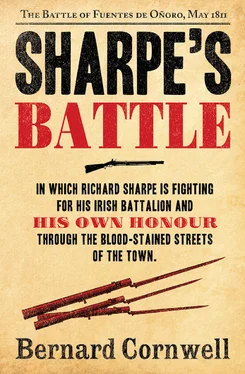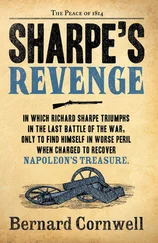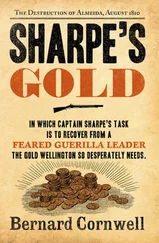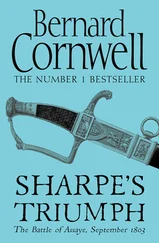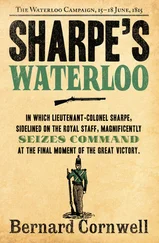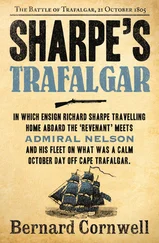‘Good,’ Juanita said simply.
‘Brigadier Loup’s patrol area is remarkably free of partisans,’ Ducos said in generous tribute.
‘But not entirely free,’ Loup added grimly. ‘El Castrador survives, but I’ll use his own knife on him yet. Maybe the arrival of the British will encourage him to show his face again.’
‘Which is why we are here,’ Ducos said, taking command of the room. ‘Our job is to make certain that the British do not stay here, but are sent packing.’ And then, in his deep and almost hypnotic voice, he described the military situation as he comprehended it. Brigadier General Loup, who had spent the last year fighting to keep the passes through the frontier hills free of partisans and who had thus been spared the disasters that had afflicted Marshal Masséna’s army in Portugal, listened raptly as Ducos told the real story and not the patriotic lies that were peddled in the columns of the Moniteur . ‘Wellington is clever,’ Ducos admitted. ‘He’s not brilliant, but he is clever and we under-estimated him.’ The existence of the Lines of Torres Vedras had been unknown to the French until they marched within cannon shot of the defences and there they had waited, ever hungrier, ever colder, through a long winter. Now the army was back on the Spanish frontier and waiting for Wellington’s assault.
It was an assault that would be hard and bloody because of the two massive fortresses that barred the only passable roads through the frontier mountains. Ciudad Rodrigo was the northern fastness and Badajoz the southern. Badajoz had been in Spanish hands till a month before and Masséna’s engineers had despaired of ever reducing its massive walls, but Ducos had arranged a huge bribe and the Spanish commander had yielded the keys to the fortress. Now both keys of Spain, Badajoz and Ciudad Rodrigo, were firmly in the Emperor’s grip.
But there was a third border fortress which also lay in French hands. Almeida was inside Portugal and, though it was not so important as Ciudad Rodrigo or Badajoz, and though its massive castle had been destroyed with the neighbouring cathedral in an earth-shattering explosion of gunpowder just the previous year, the town’s thick star-shaped walls and its strong French garrison still presented a formidable obstacle. Any British force laying siege to Ciudad Rodrigo would have to use thousands of men to guard against the threat of Almeida’s garrison sallying out to raid the supply roads and Ducos reckoned that Wellington would never abide that menace in his army’s rear. ‘Wellington’s first priority will be to capture Almeida,’ Ducos said, ‘and Marshal Masséna will do his best to relieve the fortress from the British siege. In other words, Brigadier’ – Ducos was speaking more to Loup than to the Doña Juanita – ‘there will be a battle fought close to Almeida. Not much is certain in war, but I think we can be certain of that.’
Loup stared at the map, then nodded agreement. ‘Unless Marshal Masséna withdraws the garrison?’ he said in a tone of contempt suggesting that Masséna, his enemy, was capable of any foolishness.
‘He won’t,’ Ducos said with the certainty of a man who had the power to dictate strategy to marshals of France. ‘And the reason he will not is here,’ Ducos said, and he tapped the map as he spoke. ‘Look,’ he said, and Loup bent obediently over the map. The fortress of Almeida was depicted like a star to imitate its jagged, star-shaped fortifications. Around it were the hatch marks of hills, but behind it, between Almeida and the rest of Portugal, ran a deep river. The Coa. ‘It runs in a gorge, Brigadier,’ Ducos said, ‘and is crossed by a single bridge at Castello Bom.’
‘I know it well.’
‘So if we defeat General Wellington on this side of the river,’ Ducos said, ‘then the fugitives of his army will be forced to retreat across a single bridge scarce three metres wide. That is why we shall leave the garrison in Almeida, because its presence will force Lord Wellington to fight on this bank of the Coa and when he does fight we shall destroy him. And once the British are gone, Brigadier, we shall employ your tactics of horror to end all resistance in Portugal and Spain.’
Loup straightened up. He was impressed by Ducos’s analysis, but also dubious of it. He needed a few seconds to phrase his objection and made the time by lighting a long, dark cigar. He blew smoke out, then decided there was no politic way to voice his doubt, so he just stated it baldly. ‘I’ve not fought the British in battle, Major, but I hear they’re stubborn bastards in defence.’ Loup tapped the map. ‘I know that country well. It’s full of hill ranges and river valleys. Give Wellington a hill and you could die of old age before you could shift the bugger loose. That’s what I hear, anyway.’ Loup finished with a shrug, as if to deprecate his own opinion.
Ducos smiled. ‘Supposing, Brigadier, that Wellington’s army is rotted from the inside?’
Loup considered the question, then nodded. ‘He’ll break,’ he confirmed simply.
‘Good! Because that is precisely why I wanted you to meet the Doña Juanita,’ Ducos said, and the lady smiled at the dragoon. ‘The Doña Juanita will be crossing the lines,’ Ducos continued, ‘and living among our enemies. From time to time, Brigadier, she will come to you for certain supplies that I shall provide. I want you to make the provision of those supplies to Doña Juanita your most important duty.’
‘Supplies?’ Loup asked. ‘You mean guns? Ammunition?’
Doña Juanita answered for Ducos. ‘Nothing, Brigadier, that cannot be carried in the panniers of a packhorse.’
Loup looked at Ducos. ‘You think it’s easy to ride from one army to another? Hell, Ducos, the British have a cavalry screen and there are partisans and our own picquets and God knows how many other British sentries. It isn’t like riding in the Bois de Boulogne.’
Ducos looked unconcerned. ‘The Doña Juanita will make her own arrangements and I have faith in those. What you must do, Brigadier, is acquaint the lady with your lair. She must know where to find you, and how. You can arrange that?’
Loup nodded, then looked at the woman. ‘You can ride with me tomorrow?’
‘All day, Brigadier.’
‘Then we ride tomorrow,’ Loup said, ‘and maybe the next day too?’
‘Maybe, General, maybe,’ the woman answered.
Ducos again interrupted their flirtation. It was late, his supper was waiting and he still had several hours of paperwork to be completed. ‘Your men,’ he said to Loup, ‘are now the army’s picquet line. So I want you to be alert for the arrival of a new unit in the British army.’
Loup, suspecting he was being taught how to suck eggs, frowned. ‘We’re always alert to such things, Major. We’re soldiers, remember?’
‘Especially alert, Brigadier.’ Ducos was unruffled by Loup’s scorn. ‘A Spanish unit, the Real Compañía Irlandesa, is expected to join the British soon and I want to know when they arrive and where they are positioned. It is important, Brigadier.’
Loup glanced at Juanita, suspecting that the Real Compañía Irlandesa was somehow connected with her mission, but her face gave nothing away. Never mind, Loup thought, the woman would tell him everything before the next two nights were done. He looked back to Ducos. ‘If a dog farts in the British lines, Major, you’ll know about it.’
‘Good!’ Ducos said, ending the conversation. ‘I won’t keep you, Brigadier. I’m sure you have plans for the evening.’
Loup, thus dismissed, picked up his helmet with its plume of wet grey hair. ‘Doña,’ he said as he reached the staircase door, ‘isn’t that the title of a married woman?’
‘My husband, General, is buried in South America.’ Juanita shrugged. ‘The yellow fever, alas.’
Читать дальше
